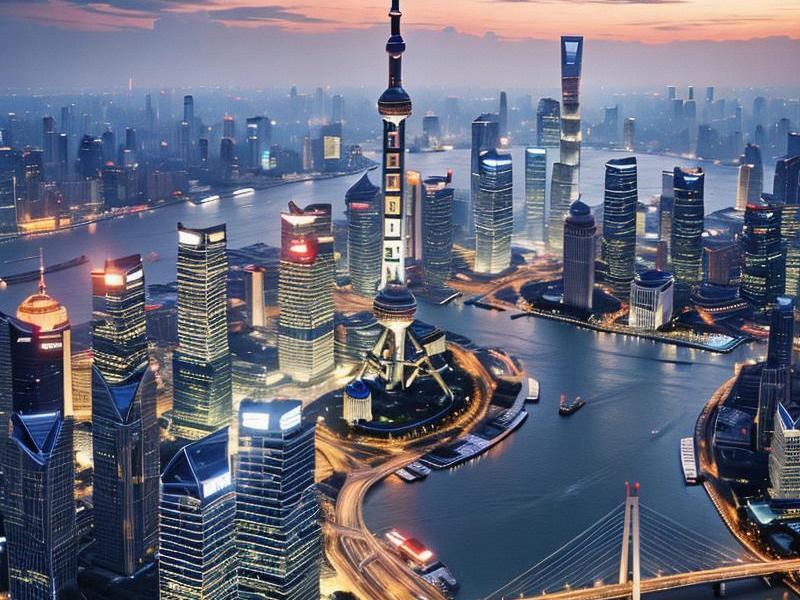This article delves into the multifaceted aspects of Shanghai, exploring its role as a global financial hub, a center for cultural exchange, and a city that continues to innovate and evolve in the 21st century.

Shanghai, often referred to as the "Pearl of the Orient," stands as a beacon of modernity and progress in China. As the largest city in the country, Shanghai is not only a significant economic powerhouse but also a vibrant cultural melting pot that attracts millions of visitors from around the world each year. This article aims to provide an in-depth look at the various facets of Shanghai, highlighting its dynamic nature, innovative spirit, and rich cultural heritage.
The Economic Engine of China
Shanghai's economic significance cannot be overstated. It is home to the Shanghai Stock Exchange, one of the largest stock exchanges in the world, and the city's port is the busiest container port globally. The Pudong area, once a rural landscape, has transformed into a modern financial district, housing the iconic Oriental Pearl Tower and the Jin Mao Tower, among other skyscrapers.
The city's economic policies have been instrumental in attracting foreign investment. The establishment of the Shanghai Free-Trade Zone in 2013 further solidified its position as a hub for international trade and commerce. Companies from around the globe have set up their regional headquarters in Shanghai, taking advantage of the city's business-friendly environment and well-developed infrastructure.
Innovation and Technology
Shanghai is at the forefront of China's technological advancements. The city has invested heavily in research and development, particularly in areas such as artificial intelligence, biotechnology, and green energy. Zhangjiang Hi-Tech Park, often referred to as "China's Silicon Valley," is a testament to Shanghai's commitment to fostering innovation.
上海贵族宝贝龙凤楼
The city's government has also been proactive in promoting digital transformation. Initiatives such as the "Shanghai Smart City" project aim to integrate technology into every aspect of urban life, from transportation to healthcare. Smart sensors, mobile applications, and data analytics are being used to improve the efficiency and quality of services provided to residents.
Cultural Hub
Beyond its economic and technological achievements, Shanghai is a city that prides itself on its rich cultural heritage. The Bund, with its historic architecture and stunning views of the Huangpu River, is a symbol of the city's colonial past and its transformation into a global metropolis. The Yu Garden, a classical Chinese garden, offers a glimpse into the traditional culture that coexists with the modernity of Shanghai.
Shanghai is also a hub for the arts. The city hosts numerous cultural festivals, including the Shanghai International Film Festival and the Shanghai Biennale, which attract artists and art enthusiasts from around the world. The city's museums, such as the Shanghai Museum and the Power Station of Art, showcase a wide range of artistic expressions, from ancient Chinese artifacts to contemporary works.
Global Influence
上海花千坊419
Shanghai's influence extends far beyond China's borders. It is a key player in international diplomacy and cooperation. The city has hosted numerous high-profile international events, including the G20 Summit and the World Expo in 2010, which brought together leaders and delegates from around the globe to discuss pressing global issues.
The city's universities and research institutions are also playing a crucial role in fostering international collaboration. Programs such as the Shanghai Cooperation Organization (SCO) and the Belt and Road Initiative have further enhanced Shanghai's global standing, promoting economic integration and cultural exchange.
Challenges and Opportunities
Despite its many achievements, Shanghai faces several challenges. Rapid urbanization has led to issues such as traffic congestion, air pollution, and housing shortages. The city government has been implementing measures to address these concerns, including the expansion of public transportation networks, the promotion of green initiatives, and the development of affordable housing projects.
One of the most significant challenges is balancing economic growth with environmental sustainability. Shanghai is taking steps to reduce its carbon footprint by investing in renewable energy sources and promoting energy-efficient technologies. The city's commitment to sustainability is evident in its efforts to crteeaa greener urban environment, with initiatives such as the construction of eco-friendly buildings and the development of urban green spaces.
上海品茶论坛
Opportunities abound for Shanghai as it continues to evolve. The city's strategic location and well-developed infrastructure make it an ideal hub for international trade and investment. As China's economy continues to grow, Shanghai is poised to play an even more significant role on the global stage.
The Future of Shanghai
Looking ahead, Shanghai's future is bright and full of promise. The city is committed to becoming a global leader in innovation, sustainability, and cultural exchange. The ongoing development of the Pudong New Area, with its state-of-the-art infrastructure and cutting-edge technology, will further enhance Shanghai's position as a global metropolis.
The city's young and dynamic population is a driving force behind its continued growth and innovation. With a strong emphasis on education and talent development, Shanghai is attracting the best and brightest from around the world to contribute to its success.
In conclusion, Shanghai is a city that embodies the spirit of progress and innovation. Its economic prowess, cultural richness, and global influence make it a unique and fascinating place to live and visit. As Shanghai continues to evolve, it will undoubtedly remain a key player in shaping the future of China and the world.